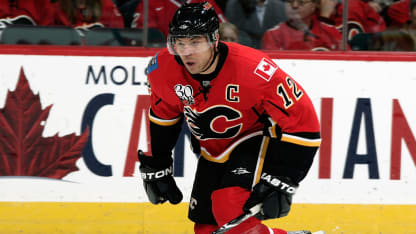From 2001-02 through 2003-04, Iginla ranked first in the NHL with 128 goals. Since the 1967 expansion, that three-year peak is tied for No. 62 with Bill Barber and John MacLean. However, Barber and MacLean played in higher-scoring eras where the same 128 goals ranked sixth and 10th, respectively.
To more accurately compare players from different eras, it's necessary to adjust their goal totals for changes in NHL scoring levels. For example, the average player scored 0.145 goals per game during Iginla's peak seasons, down from 0.224 during Barber's peak (1979-80 to 1981-82), and 0.202 during MacLean's peak (1988-89 to 1990-91).
To calculate a player's era-adjusted goals, divide his goals by the average player's goals per game for that period, then multiply it by the modern (post-2005) standard of 0.154 goals per game. From that perspective, Iginla's peak of 135.4 era-adjusted goals ranks No. 14, well ahead of Barber (87.8) and MacLean (97.7).
RELATED: [NHL.com writers discuss Iginla's career | Iginla career timeline]
There are 13 players with higher peak scoring levels than Iginla, but few matched his consistency and longevity. Rather than briefly achieving a high peak in an otherwise modest career, Iginla continued to score at a higher-than-average level for much of his career. He had 50 goals in 2007-08 and 43 in 2010-11.
Scoring consistency was a factor in Iginla's success. He scored at least 30 goals in 11 consecutive seasons from 2000-01 to 2011-12. He scored 14 goals during the 48-game 2012-13 season, which he split between Calgary and the Pittsburgh Penguins, then had 30 with the Boston Bruins in 2013-14 and 29 with the Colorado Avalanche in 2014-15. He also scored 28 goals in 1998-99 and 29 in 1999-2000, meaning that Iginla wasn't far removed from matching the NHL record of 15 consecutive 30-goal seasons shared by Mike Gartner and Jaromir Jagr.
Iginla missed 52 games during his 20-season career, almost all of which was spent as a top-six forward. That longevity allowed him to score 625 goals, which is tied with Joe Sakic for No. 14 since the 1967 expansion. Iginla and Sakic are tied for 15th on the all-time NHL list.
Again, these totals need to be adjusted to make it possible to compare players from different eras. Once applying the same adjustments as above, Iginla has 633.8 era-adjusted goals, which ranks fifth behind Jaromir Jagr (736.6), Wayne Gretzky (668.7), Teemu Selanne (657.8) and Brett Hull (649.0). Each of those four players had higher peak scoring rates than Iginla, but they had the advantage of playing on higher-scoring teams.
Iginla scored 21.8 percent of Calgary's goals during his three-year peak, which is ahead of that group's average of 21.5 percent.
Aside from a player's team and changes in NHL scoring levels, there are factors that can influence a player's scoring. The number of games in a season, ice time (particularly on the power play), deployment and rules changes are four of the biggest variables.
Also, players from the pre-expansion era must be considered. Charlie Conacher, Maurice Richard, Bobby Hull, and Gordie Howe obviously would be in any discussion of prolific goal-scorers.
It is impossible to construct a definitive ranking of history's best goal-scorers, but the combination of Iginla's high three-year peak scoring level, his consistency and his longevity put him in the conversation and make it reasonable to include him among the top five in the post-expansion era.

